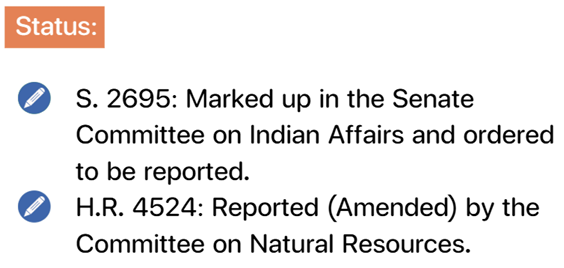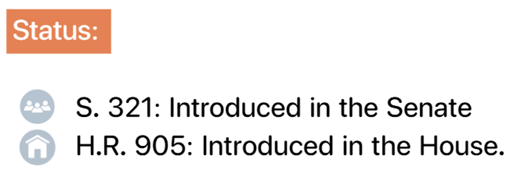Review of the 118th Congress Legislative Update

Public Safety
Bridging Agency Data Gaps for Native Communities (BADGES) Act (S. 465 / H.R. 1292)

The bill would promote recruitment and retention of federal law enforcement, address inefficiencies in federal missing persons data systems, increase Tribal access to the National Missing and Unidentified Persons System (NamUs), and establish a grant program to improve coordination efforts between states, Tribal Nations, and Tribal organizations on cases of missing and murdered persons.
What Are the Implications for Native Women, Survivors, and Communities?
BADGES would increase coordination, retention, and effectiveness of federal missing persons resources and give Tribal Nations resources to better address the crisis of missing and murdered Indigenous women and relatives.
Parity for Tribal Law Enforcement Act (S. 2695 / H.R. 4524)

The bill would improve public safety in Indian country by promoting the recruitment and retention of Tribal law enforcement. More specifically, the bill would:
- Authorize the law enforcement officers of any Indian Tribe that has contracted or compacted any or all federal law enforcement functions through a contract or compact entered into pursuant to the Indian Self-Determination and Education Assistance Act to enforce federal law within the Tribe’s jurisdiction if those officers meet specific qualifications. These qualifications include completing training and passing an adjudicated background investigation.
- Deem a Tribal law enforcement officer acting under an authorized contract or compact as a federal law enforcement officer for specific federal laws, including for injury and death, retirement, and pension benefits.
- Require the Department of the Interior to (1) develop procedures for credentialing Tribal officers to confirm they meet minimum certification standards and training requirements for Indian country peace officers and (2) issue guidance to implement this bill.
- Require the Department of Justice to coordinate and oversee its functions and programs to ensure a coordinated approach to public safety in Indian communities.
What Are the Implications for Native Women, Survivors, and Communities?
The Parity for Tribal Law Enforcement Act would address the crisis of missing and murdered Indigenous women and relatives and enhance Tribal public safety by improving recruitment and retention of Tribal law enforcement officers. Indigenous women and relatives.
Strengthening Protections for Domestic Violence and Stalking Survivors Act of 2023 (S. 321 / H.R. 905)

The bipartisan, bicameral bill would close what is known as the “dating loophole” or “boyfriend loophole” by preventing convicted stalkers and former dating partners convicted of domestic violence from purchasing or owning firearms. Current law prohibits spouses, former spouses, those cohabitating together, and those who have a child in common from owning a firearm if there is a protective order against them. The bill would add convicted stalkers and dating partners convicted of domestic violence to this list to close those gaps that embolden abusers and put women in danger.
What Are the Implications for Native Women, Survivors, and Communities?
American Indian and Alaska Native women are more than two times more likely than White women to be fatally shot by an intimate partner. Closing the dating loophole would create additional protections for Native victims of domestic violence by preventing stalkers and all forms of dating partners convicted of a domestic violence offense from buying or owning firearms.
Honoring Promises for Native Nations Act
A bill to ensure progress toward the fulfillment by the Federal Government of its trust and treaty obligations to Native Americans and Tribal governments and to ensure funding for programs for Native Americans and Tribal governments.
What Are the Implications for Native Women, Survivors, and Communities?
The bill would reaffirm the nation-to-nation relationship between the federal government and Tribal Nations and improve federal programs that support Indian Country, including funding for public safety and programs that serve American Indian and Alaska Native victims of crime.
Economic Security
The Security and Financial Empowerment (SAFE) for Survivors Act (S. 5132 / H.R. 9693)

The SAFE for Survivors Act allows victims to take time off from work—40 days of leave, ten of which must be paid—without penalty to contend with the consequences of gender-based violence, prohibits discriminatory employment practices in connection with survivors of domestic violence or sexual violence, allows victims in every state access to unemployment benefits if they are fired or forced to leave their job because of abuse, and prohibits denial or restriction of insurance coverage based on the status of the applicant or insured regarding abuse or abuse related claims.
What Are the Implications for Native Women, Survivors, and Communities?
This bill would support economic security for survivors of gender-based violence, including those who experience disproportionate rates of violence, such as American Indian, Alaska Native, and Native Hawaiian people. The SAFE for Survivors Act would prevent survivors from having to choose between their job and their safety when attempting to leave an abusive relationship or contend with the consequences of violence.
Shelter and Victim Services
Crime Victims Fund Stabilization Act (S. 4514 / H.R. 8061)

The bill would temporarily increase deposits to help stabilize the Crime Victims Fund (CVF) by redirecting some of the funds collected from the False Claims Act to the CVF through 2029.
What Are the Implications for Native Women, Survivors, and Communities?
The Crime Victims Fund (CVF) provides non-taxpayer funding to thousands of victim assistance programs throughout the United States. In recent years, the deposits into the CVF have declined, resulting in cuts to the annual release of funds available for essential services and support for survivors. This bill would ensure that vital victim services remain available, including in Indian Country, by temporarily adding additional funding to the CVF.
Family Violence Prevention and Services Improvement Act of 2023 (FVPSA) (S. 2693 / H.R. 2604)

The bill, which would reauthorize FVPSA through FY2028, would provide critical funding for shelter and supportive services for domestic violence victims. FVPSA is the primary source of funding for these services for Tribal Nations.
What Are the Implications for Native Women, Survivors, and Communities?
FVPSA would expand grant programs and make many needed improvements so that more survivors have access to support and safety, including:
- Adjustment of the funding distribution formula to increase the amount that Tribal Nations receive from 10% to 12.5%.
- Dedicated funding for Tribal coalitions to provide technical assistance to Tribal Nations.
- Permanent funding for the national Indian domestic violence hotline.
- Permanent funding for the Alaska Tribal Resource Center on Domestic Violence.
- Permanent funding for the Native Hawaiian Resource Center on Domestic Violence.





